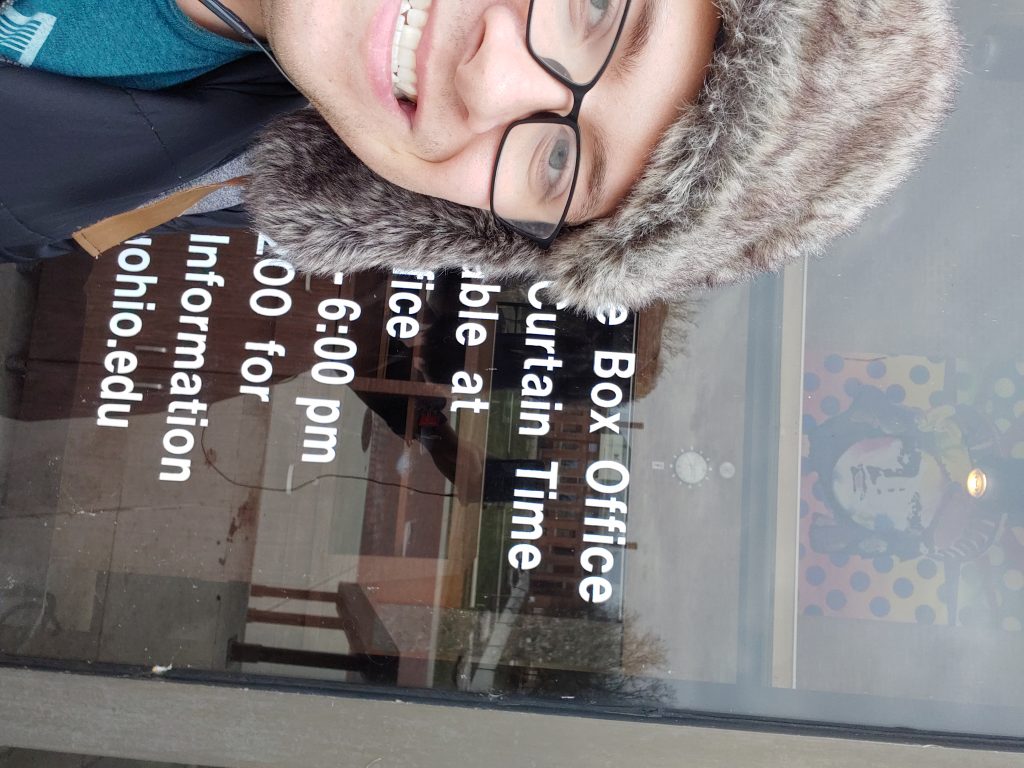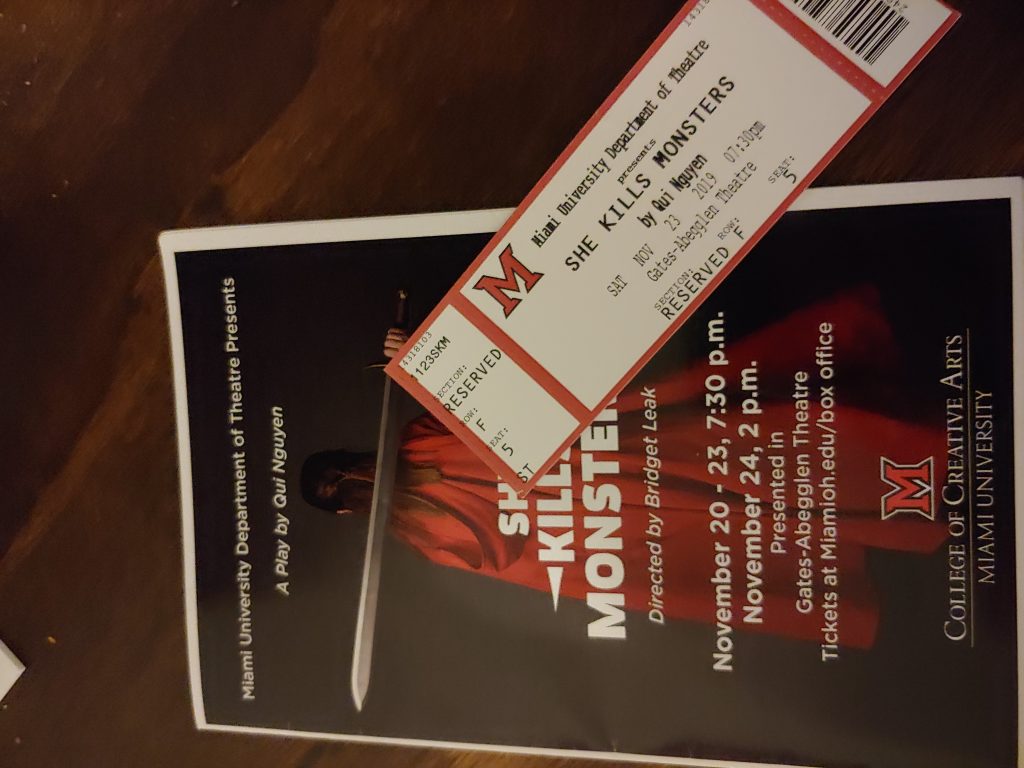

Review
She Kills Monsters is a play by Qui Nguyen and was directed by Bridget Leak at Miami University. The play centers on the character Agnes after her whole family dies in a terrible car accident. After the accident Agnes is plagued by her idea that she never really got to learn about her younger sister Tilly. Tilly and Agnes were polar opposites, Agnes was the girl that was into boys and music while Tilly was more into nerdy things such as robotics and the popular game Dungeons and Dragons. Agnes, distraught by the notion that she never really bonded with her sister stumbles upon one of Tilly’s Dungeon and Dragon’s campaigns and decides to seek help from Chuck, a local nerd, in order to play the campaign. Throughout the campaign she begins to learn new things about her sister and about herself. I will be focusing on leadership and gaming in Dungeons and Dragons for the remainder of my review.
An important note is that Agnes talks to Tilly throughout the play as though she is alive so please bear with me changing my tenses while writing this review.
Dungeons and Dragons is a game where anyone can be anything they want to be! If you want to be a badass barbarian that uses brute strength to conquer his enemies, you can make and play as that character. If you would rather use your wit and magic to aid you on your journey, there is a character for you. This means that players can explore aspects of themselves that they can only dream about and this gives players a small sliver of wish fulfillment that they cannot experience in real life. For example, Tilly is gay so in her campaign she gets the girl, Lily, that she has a crush on. Other than wish fulfillment, Dungeons and Dragons gives players a chance to develop their personal leadership skills as they will often work within a party or group to play through their campaign. They will have to utilize different leadership skills such as strong communication, democratic leadership, and affiliative leadership in order for their party to be victorious in the campaign and have fun along the way. Dungeons and Dragons is also a role-playing game and players need to be involved in the story in order for their group to get the most out of the game. This means that players need to put aside personal issues like the idea that they may feel silly role-playing in order for everyone to enjoy the game session. This is a great example of leadership as players put the needs of the group above the needs or wants of themselves.
In the beginning of the campaign, Agnes is very sarcastic and kind of off putting to her group. She is given the name “Agnes the ass-hatted” as a result of her attitude. This destroys the game for some members of her party and quickly realizes that for her whole group to have fun in the campaign it is better if she gets more into the game rather that just judging everything in it. She makes this transition very slowly over the course of the play but by the end she is very into the concept of Dungeons and Dragons and admits to her sister that she had fun while playing. This shows her development as a leader in the fact that leaders often need to work well and consider group dynamics when working for, or in, a group setting. Sometimes you need to put aside your own personal opinions for your group to be effective. If people feel judged by another member or the leader in their group it can cause them to contribute less or feel like they can’t contribute without judgement. Agnes finally develops this leadership skill and her group bonds quickly as a result. This is an example of affiliative leadership, as she caused the group to bond as she promoted harmony within the group.
The major part of the play that troubled Agnes was finding out that her sister was a lesbian. An exchange happened between Tilly and Agnes where Tilly says that her sister shouldn’t care if she is lesbian because she is still herself. Agnes responds by saying that this is something that she should have known about her sister. She was more shocked that she didn’t know her sister even more than she previously realized and focused more on that than being present in the moment. This caused her to upset Tilly. This happens quite a lot in the lgbtq+ community as family members often take personal responsibility, saying things such as “you’re not gay, I would know if you were gay” or “how could I not see this coming” and many other responses. This puts the person that just came out in an awkward position where they now have to try and comfort themselves, their family members, and defend the fact that they are actually gay and that it is okay, all at the same time. In situations like these it is important for people to take a step back and realize that it is not about them. Coming out to someone takes tremendous courage and is often a very challenging decision, if the interaction does not go as planned it can cause the member of the lgbtq+ community to feel like it is somehow their fault and can cause them to internalize feelings of hatred towards themselves. After this interaction Agnes meets Lily, the girl Tilly had a crush on while she was alive. After talking to Lily Agnes realizes that being lesbian does not change who Tilly was but does mean that she had to deal with a lot of challenges that Agnes didn’t previously realize. After this, Agnes apologizes to Tilly taking responsibility for the way she acted and telling her that she is sorry that she couldn’t be there for her while she was alive.
Democratic leadership is also practiced in Dungeons and Dragons. Agnes and her party had to defeat a number of bosses by working together. Democratic leadership means that every member shares the power when making decisions. This can be shown to be important for when the group fought their first boss, a fairy in the forest. All the members of the group opted to charge the boss one-by-one and take a very individualistic approach when fighting the boss. It quickly becomes apparent that they need to work together and come up with a common plan of attack and goal in order to be successful through their campaign. As the group worked more and more as a unit Agnes’s skills in democratic leadership grew.
Overall, I loved the play! I didn’t think I was going to like it at all because I don’t really like Dungeons and Dragons or those kinds of role-playing games. However, I was pleasantly surprised by how funny the play ended up being and caught myself laughing out loud a few times. I really like how they made some Dungeons and Dragons related jokes throughout the story and was presented in a way anyway could understand. For instance, at the end of the play Tilly tells Agnus that she isn’t actually a Paladin and that she should have known because Paladin’s can’t cast “Magic Missile” but Tilly had towards the beginning of the campaign. In the end I definitely walked away with a newfound appreciation for Dungeons and Dragons, I still don’t think it’s for me, but I better understand what draws people towards the game.
~ Ryan Estep

